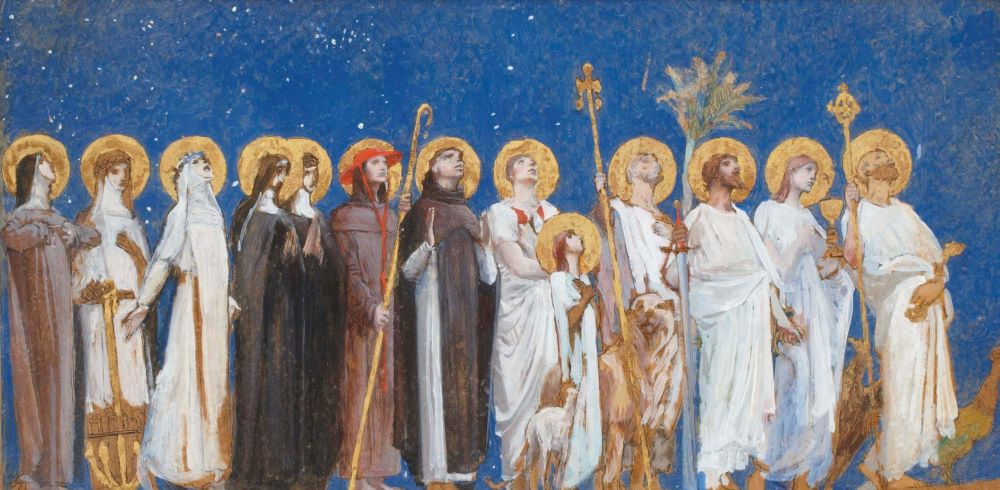
"Saints en processiona" by Luc-Olivier Merson (1846-1920) (Artvee)
When we use the phrase, "Jesus' passion," we automatically think of the cross. That's natural, yet the cross is only one dimension of the story. Listen to Jesus in today's Gospel: "I have come to set the Earth on fire, and how I wish it were already blazing! … Do you think that I have come to establish peace on the Earth? No … but rather division."
That passionate talk sounds shocking coming from the mouth of the Prince of Peace, the one known for saying, "Come to me … I am meek and humble of heart … my yoke is easy, and my burden light" (Matthew 11:28-30). Perhaps all we can say is "two things can be true at once."
What we hear from Jeremiah today could easily be applied to Jesus. Scripture scholar Sr. Dianne Bergant comments on Jeremiah's predicament saying, "Here is an instance in which the word of God spoken by the prophet and the policies of the nation are in deadly conflict. In such a situation, the one who speaks in God's name is likely to pay the price."
How many people in how many places in how many moments of history have faced similar situations? The Letter to the Hebrews exhorts us, "Since we are surrounded by so great a cloud of witnesses … let us rid ourselves of every burden and sin that clings to us and persevere."
This reminds me of Byzantine Catholics in Romania who survived 50 years of communist oppression when the government declared their church extinct and threatened them with death-dealing prison sentences if they continued to practice their faith. Their seven bishops were arrested and told that only by converting to the Orthodox Church would they be safe. They all chose prison, where many of them, along with laity, priests and sisters died as martyrs.
That's a cloud of witnesses! Like Jesus, with nothing but faith in "the joy that lay before them," they endured their enemies' attempts to break them. They knew who they were and refused to be anything else. They shared what Rabbi Abraham Heschel calls "the pathos of God." According to Heschel, the God of Israel is never impersonal or dispassionate. Rabbi Bradley Shavit Artson adds that God is "dynamically engaged in every level of creation, passionately urging us to ethical greatness." That's Jesus' fire.
People who heed God's urging toward ethical greatness share God's passion for the good of the world. Their reward? They suffer with God when people thwart movement toward that good. Like Jeremiah who protested that God had "seduced" him and made prophecy like a fire in his heart (Jeremiah 10:7-9), people who have been captivated by God share Jesus' passion for goodness and justice. They suffer from the fact that their message will cause division. They know Jesus' anguish as they wait for God's reign of love to rule on Earth.
Think of Greta Thunberg whose efforts have brought immense attention to the crisis of Earth. For that, she has been the object of derision, criticized as mentally unstable and the child of a deeply disturbed family. Russian President Vladimir Putin himself weighed in, calling her kind and sincere, but poorly informed. Her committed Muslim contemporary, Malala Yousafzai, began her advocacy for girls' education at age 11. The Taliban shot her for her efforts, only to increase her fame and the power of her message.
For people like these young women, two things can be true at once: A message of justice and peace can also cause conflict on both the personal and social levels.
Advertisement
Jesus came to set Earth on fire with God's love, knowing that he would be burned in the process. The author of the Letter to the Hebrews pleads with us to "persevere in running the race," to "keep our eyes fixed on Jesus."
Faith in Jesus leaves no room for complacency in a world of injustice. The Russian novelist Fyodor Dostoevsky wrote that "love in action is a harsh and dreadful thing." Yet, he says that just when you think that in spite of your efforts, you are further from your goal than ever, "you will suddenly reach your goal and will clearly behold … the wonder-working power of the Lord who all the while has been loving you … and mysteriously guiding you."
Today, in much of the world, the policies of nations are in deadly conflict with the word of God. When we hear Jesus say, "I have come to set the Earth on fire," he's asking if we are ready to burn with his zeal and face the peril it entails. We pray, "by your cross and resurrection, you have set us free." Are we free enough to share in Christ's passion?
